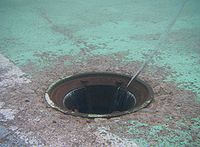
Drain (plumbing)
Encyclopedia


Waste versus re-circulated drains
In some systems the drain is for discharge of waste fluids, such as the drain in a sinkSink
A sink is a bowl-shaped plumbing fixture used for washing hands, for dishwashing or other purposes. Sinks generally have taps that supply hot and cold water and may include a spray feature to be used for faster rinsing...
in which the water is drained when it is no longer needed.
In the United Kingdom, plumbers refer to waste water as 'bad water'. This is under the premise that the water they are moving from one area to another via the use of a drain is not needed and can be removed from the area, like a 'bad apple' being removed from a fruit bowl.
In other systems, such as fountains or swimming pools where waste fluid is recirculated, the drain is the input to the recirculating pumping machine.
In the last case, there is an obvious safety issue, because many people do not expect to encounter more than the head of water above the drain when touching a drain. For example, in a recent case, a lifeguard went to the bottom of a pool to retrieve something and his hand got stuck because of the extra pressure from the pump. When there is a recirculating pump, the risk of suction consists of the head of water, plus the suction of the pump (up to a maximum of 1 atmosphere).
Fatalities have occurred around drains as a result of this suction entrapment or Duct Entanglement. In these situations, a portion of the body, hair, or clothing may become stuck against the drain and may become impossible to release, resulting in drowning
Drowning
Drowning is death from asphyxia due to suffocation caused by water entering the lungs and preventing the absorption of oxygen leading to cerebral hypoxia....
. Properly designed drains in swimming pools and spas mitigate this effect by either adding multiple drains, or increasing the surface area of the drain opening, with the use of many holes or safety covers. Since drain suction increases rapidly when a portion of the drain opening is blocked, having two drains or a larger drain inlet allows alternate suction paths for the pump. Swimming pool safety devices are available to automatically turn off an operating pump if a rapid increase in suction is detected (as could happen during a suction entrapment incident).
While fear of the drain may be counterproductive, children should be taught not to intentionally touch or attempt to block components of a swimming pool recirculation system.
Multiple drains
As a matter of safety, there should be multiple drains in pools and public fountains, to help reduce dangers of pipe entubement and flume debunkment. In some locales, multiple drains are legally mandated on all public swimming pools, and this is becoming increasingly common in new construction residential pools.Since children often play in public fountains, the use of multiple drains is a mandatory safety feature regardless of whether or not the architect or planner intends that the fountain be used as an aquatic play feature. This is to ensure minimal risk of plumbing entrapment, but vandals can sometimes break into drains in the night time and remove the covers (commonly known as drain mugging). This can make drains very dangerous.
Incidents involving safety of drains
In 1994, Cristin Fitzpatrick drowned in a Variety Village swimming pool when her hair became entangled in a water funnel.Legislation
On December 17, 2007 the Virginia Graeme Baker Pool And Spa Safety ActVirginia Graeme Baker Pool And Spa Safety Act
The Virginia Graeme Baker Pool And Spa Safety Act is a United States law named after the daughter of Nancy and James Baker and the granddaughter of former Secretary of State James Baker III. Graeme Baker died in a tragic incident in June 2002 when the suction from a spa drain entrapped her under...
(P&SS Act) was passed into law in the United States by George W. Bush
George W. Bush
George Walker Bush is an American politician who served as the 43rd President of the United States, from 2001 to 2009. Before that, he was the 46th Governor of Texas, having served from 1995 to 2000....
. Effective on December 19, 2008, this law seeks to bring an end to suction entrapment related injuries and deaths by incorporating consumer protection regulation to pool and spa drains.
See also
- Drainage systems
- PlumbingPlumbingPlumbing is the system of pipes and drains installed in a building for the distribution of potable drinking water and the removal of waterborne wastes, and the skilled trade of working with pipes, tubing and plumbing fixtures in such systems. A plumber is someone who installs or repairs piping...
- Domestic water system
- Septic system
- Plumbing drainage ventingPlumbing drainage ventingIn modern plumbing, a drain-waste-vent is part of a system that removes sewage and greywater from a building and regulates air pressure in the waste-system pipes, facilitating flow. Waste is produced at fixtures such as toilets, sinks and showers, and exits the fixtures through a trap, a dipped...
- Sewage collection and disposalSewage collection and disposalSewage collection and disposal systems transport sewage through cities and other inhabited areas to sewage treatment plants to protect public health and prevent disease. Sewage is treated to control water pollution before discharge to surface waters....
- Trench drainTrench drainA trench drain is a specific type of floor drain containing a dominant through- or channel-shaped body. It is used for the rapid evacuation of surface water or for the containment of utility lines or chemical spills...
(Channel drain)

